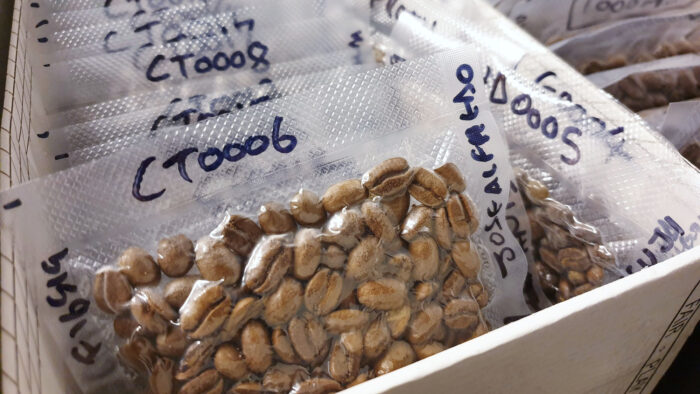It happens frequently – you buy or grind more coffee than needed for your morning brew. Rather than wasting precious beans, why not freeze extra grounds for preserving freshness? Freezing locks in flavor and aroma compounds, letting you tap into leftovers later while still retaining quality. In this post we talk about Freeze Coffee Grounds.
Learn if and how freezing works for maintaining your favorite coffees when you inevitably end up with excess grounds.
The Case for Freezing Coffee Grounds
Coffee beans and grounds are inherently unstable, quickly deteriorating through factors like:
Oxidation – Exposure to oxygen degrades delicate compounds.
Moisture Loss – Coffee dries out over time, losing aromatic oils.
CO2 Depletion – Natural off-gassing weakens flavors.
Heat Exposure – Light and warmth accelerate breaking down.
These instability factors explain why coffee is best when freshest. But what about leftovers that would otherwise get tossed or go stale? Freezing offers a preservation assist.
Benefits to Freezing Spent and Extra Grounds
Freezing coffee grounds essentially presses pause on the aging process. The frozen state protects integrity by:
Slowing Oxidation – Ultra-low temperatures minimize chemical reactions with oxygen.
Preventing Moisture Loss – Ice crystallization preserves water content.
Halting CO2 Loss – Frozen CO2 stays trapped inside grounds.
Blocking Heat Exposure – Cold storage guards against damage from light and ambient heat.
The frozen stasis creates a protective bubble keeping coffee’s enemies at bay. Grounds enter suspended animation until the next use. Thawing then reanimates them near their peak level when initially frozen.
What About Freezing Extracted Brews?
Freezing also works wonders for preserving finished beverages like leftover cold brew batches. The same protection principles apply. Provided you leave headspace for expansion and avoid freezer burn by using an airtight container, frozen coffee drinks retain integrity too.
Thaw, dilute if concentrated, and enjoy later with almost no discernible loss from when first made. Just be aware that coffee’s acidic nature can degrade plastic over repeat uses. So opt for glass jars whenever possible.
Maximizing Ground Coffee Freezer Longevity
Follow best practices when freezing coffee grounds:
1. Let grounds fully de-gas after opening from roast date, at least 5-7 days. Freezing too early traps excess CO2 that emerges as ice crystals damaging cell structures upon thawing.
2. Portion into usable amounts within airtight bags or containers allowing headspace. Avoid repeatedly exposing to air and moisture every time you open to scoop a bit out.
3. Apply labels with coffee name and freeze date for tracking shelf life.
4. Use grounds within 1 month for optimum freshness. Flavor decline will happen eventually even when frozen.
5. For thawed grounds destined for cold brew, use immediately after fully defrosting. For other methods, use within a few days.
The freezer can’t prevent deterioration indefinitely but does dramatically extend coffee’s lifespan. Manage headspace, exposure, dating, and timely usage and frozen grounds retain vibrancy far longer, avoiding waste.
Thawing Frozen Coffee Grounds
Always defrost coffee grounds completely before using:
1. Shake frozen bag to break apart lumpier parts as they start softening.
2. Leave sealed bag on countertop to gradually warm nearer to room temperature.
3. Alternatively, run container under cool tap water. The gentle temperature transition prevents moisture issues.
4. Use hands or gentle tools to break down any clumps once malleable enough before scooping grounds out.
Ideally thawed grounds should resemble freshly ground coffee in look and feel. Never use while still icy as remaining frozen moisture alters extraction and permeability. Allow full thawing over a few hours depending on volume to ready grounds for peak flavor.
Brewing Coffee from Once Frozen Grounds
For best results:
• For drip machines, use a cone filter instead of compact basket to allow room for post-thaw expansion.
• Choose immersion methods like French Press if grounds seem a little drier or cell structures slightly collapsed.
• Stay vigilant about not overextracting as freezer damage to solids exposes more surface area to water.
• Expect somewhat muted aromatics and brighter tastes compared to the true fresh version.
Account for structural changes freezing brings when dialing in parameters. But frozen/thawed beans still provide delicious, quality coffee far preferable to chucking excess grounds!
Be selective about which specialty coffee you invest effort preserving via the freezer. Save it for grounds impossible to use up before staling but too precious to waste! Follow best practices and even months later, unlocking their suspended flavor makes home barista life easier plus more budget and earth-friendly.

